Bob Carter's Financial Post Gish Gallop of Scientific Denial
Posted on 29 May 2012 by dana1981
Climate contrarians often exhibit what we have described as the 5 characteristics of scientific denialism. These characteristics involve various ways in which people will deny scientific reality by rejecting and misrepresenting data and evidence. These characterisitcs are often exhibited in the form of a Gish Gallop, which describes the technique of repeating a large number of incorrect or misleading statements in such a short amount of time that it becomes difficult to refute them all.
Bob Carter has recently gotten such a Gish Gallop article published in the Canadian Financial Post, which was uncritically re-posted by the usual climate denial enablers. In this relatively short article, Carter manages to toss out nearly a dozen climate myths and tick off three of the five scientific denialism characteristics.
Bob Carter: Fake Climate Expert
The first characteristic of scientific denialism Carter checks off is that of Fake Experts:
"These are individuals purporting to be experts but whose views are inconsistent with established knowledge."
In this article, Carter peppers out one wholly unsubstantiated claim after another. We'll look at the accuracy of these claims below (suffice it to say most of Carter's assertions are false), but just as importantly, Carter makes no effort to support his assertions. The article contains no references, no links, just seemingly factual statements which the reader is expected to believe, presumably because Carter is a climate expert. In fact, the article closes by giving Carter's supposed qualifications:
Bob Carter, a paleoclimatologist at James Cook University, Australia, and a chief science advisor for the International Climate Science Coalition, is in Canada on a 10-day tour...
Carter's article deals with climate science and economics, so being a paleoclimatologist would certainly make him a credible speaker on the science - if it were true. However, Carter has published very few climate-related papers. His only climate science publication in the past 7 years is McLean et al. (2009), on which Carter was listed as the third of three authors, which made assertions not supported by its scientific evidence and was immediately refuted by Foster et al. (2010), and was the basis of one of the worst global temperature predictions in history.
Bob Carter has a long and distinguished scientific career - in marine geology. He is a marine geologist, not a paleoclimatologist. Normally we don't place very much emphasis on a person's background because the content and accuracy of their comments are what matters, and that is true of Carter's article as well (whose content we will address below). However, in this case Carter has asked the Financial Post readers to believe him by posing as a fake expert, claiming credentials which he has not earned. And citing fake experts is a classic characteristic of scientific denialism. Carter has perhaps taken this to the extreme by himself playing the role of the fake expert.
Misrepresentations and Logical Fallacies
Another characteristic of scientific denialism involves misrepresentations and logical fallacies, and Carter's article has both in spades.
"Over the last 18 months, policymakers in Canada, the U.S. and Japan have quietly abandoned the illusory goal of preventing global warming by reducing carbon dioxide emissions. Instead, an alternative view has emerged regarding the most cost-effective way in which to deal with the undoubted hazards of climate change.
This view points toward setting a policy of preparation for, and adaptation to, climatic events and change as they occur, which is distinctly different from the former emphasis given by most Western parliaments to the mitigation of global warming by curbing carbon dioxide emissions."
Here Carter starts out with a glaring logical fallacy, assuming that the failure to pass greenhouse gas emissions reduction legislation in these 3 countries means they must have decided that adapting to the consequences of climate change is more cost-effective. This is pure fiction.
In the USA there is currently a major divide between the two major political parties regarding climate change, and the lack of climate legislation is a consequence of that divide, not a result of climate adaption becoming cheaper than mitigation. Similarly the current Canadian government is a conservative one which still speaks about the importance of reducing greenhouse gas emissions, despite its failure to take serious actions to accomplish that goal.
In fact, at the same time as Carter's article was published, all 3 nations were participating in the Bonn Climate Change Conference, attempting to negotiate agreements to reduce emissions. All 3 nations have agreed to a goal (limiting global warming to 2°C above pre-industrial levels) which cannot be achieved without major emissions cuts. The USA has implemented regulations on CO2 emissions and new fuel efficiency standards, not to mention individual state legislation (like California's carbon cap and trade system). Canada and Japan have also implemented various energy efficiency policies.
These policymakers have not suddenly decided that adaption is the cheaper option, because that's simply not the reality of the situation. Economic studies consistently show that mitigation is several times more cost-effective than adaption (Figure 1).
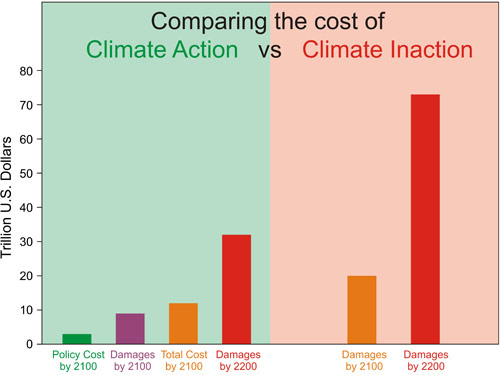
Figure 1: Approximate costs of climate action (green) and inaction (red) in 2100 and 2200. Sources: German Institute for Economic Research and Watkiss et al. 2005
Bob Carter has not given us any reason to believe otherwise. He has simply asserted that because policymakers have failed to reduce emissions, they must believe that adaption is cheaper. This logical fallacy is Carter's second characteristic of scientific denial.
Radios-Own Goal
Carter proceeds to try and convince his readers that the planet hasn't even warmed significantly. He approaches this argument by first attempting to pooh-pooh the surface temperature record, as climate contrarians so often do, and then proceeding to claim the satellites show no significant warming. In the process, Carter scores a major 'own goal'.
"For many different reasons, which include various types of bias, error and unaccounted-for artifacts, the thermometer record provides only an indicative history of average global temperature over the last 150 years."
As Skeptical Science readers are undoubtedly aware (since we have to refute this particular myth quite frequently), the accuracy of the surface temperature record has been confirmed time and time again (i.e. Peterson et al. 2003, Menne et al. 2010, Fall et al. 2011 [which includes Anthony Watts as a co-author!], Muller et al. 2011 [the BEST project], etc.). Carter's claim that the record only provides "an indicative history" of actual temperature changes is entirely without merit, and of course as with all his assertions, is entirely unsupported.
"The 1979-2011 satellite MSU (Microwave Sounding Units) record is our only acceptably accurate estimate of average global temperature, yet being but 32 years in length it represents just one climate data point. The second most reliable estimate of global temperature, collected by radiosondes on weather balloons, extends back to 1958, and the portion that overlaps with the MSU record matches it well.
Taken together, these two temperature records indicate that no significant warming trend has occurred since 1958..."
This gross misrepresentation of the radiosonde record (misrepresentation being another of those pesky characteristics of scientific denial) is where Carter scores an own goal. While there is no basis to the claim that the radiosonde record (instruments on weather balloons) is more reliable than the surface temperature record, more importantly, the radiosonde record actually shows more warming than the surface record (Figure 2).
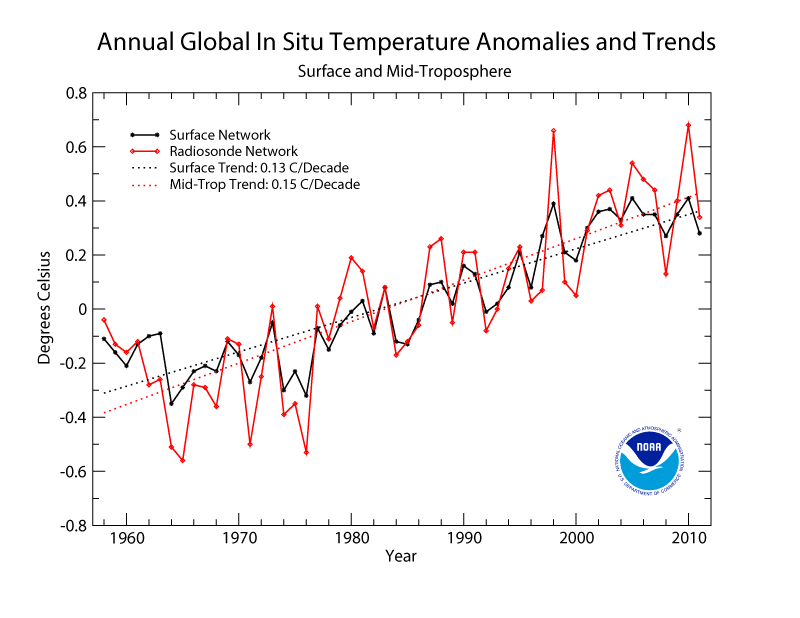
Figure 2: NOAA RATPAC radiosonde temperatures (red) and surface temperatures (black)
Carter's argument amounts to 'you shouldn't trust the warming in the surface temperature record, you should trust the radiosonde record', yet the radiosonde record shows even more warming. However, to realize this, Carter's audience would have to fact check him and look up the data themselves, as we have. Perhaps Carter was banking on the financial newspaper and climate denialist blog readers not bothering to fact check the claims of a "paleoclimatologist."
Note also that Carter has cherrypicked lower atmosphere temperatures, whereas the vast majority of global warming (about 90%) goes into heating the oceans, which continue to accumulate energy at a rapid rate.
Step Dysfunctions
Next up, Carter misrepresents the temperature data once again.
"...both [radiosondes and satellites] exhibit a 0.2C step increase in average global temperature across the strong 1998 El Niño."
We'll leave this one to our readers - does the red data in Figure 2 look like a step change occurred in 1998? Or is Carter perhaps confusing a linear warming trend plus random noise and natural cycles with a 'step function'?
Cherry Sun
Carter proceeds to illustrate a third characteristic of scientific denial, cherrypicking.
"In addition, the recently quiet Sun, and the lack of warming over at least the last 15 years — and that despite a 10% increase in atmospheric carbon dioxide level, which represents 34% of all post-industrial emissions — indicates that the alarmist global warming hypothesis is wrong and that cooling may be the greatest climate hazard over coming decades."
Here Carter cherrypicks the low solar activity of the past decade, blaming it for the dampened surface warming, while ignoring that temperatures and solar activity have not been remotely correlated for the past 40 years (Figure 3).
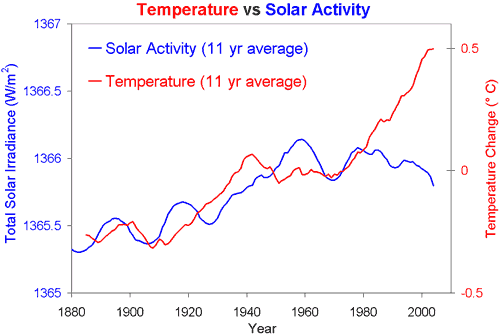
Figure 3: Global surface temperature (red, NASA GISS) and total solar irradiance (blue, 1880 to 1978 from Solanki, 1979 to 2009 from PMOD).
For the nitpickers amongst us, we should also note that the CO2 increase over the past 15 years (29 parts per million by volume [ppmv]) is only 26% of the increase since pre-industrial times (approximately 112 ppmv), not 34%, as Carter asserts. However, arithmetic errors are the least of Carter's problems in this article.
'Paleoclimatologist' Unfamiliar with Paleoclimate Data
Carter proceeds to misrepresent the paleoclimate record.
"...numerous high-quality paleoclimate records, and especially those from ice cores and deep-sea mud cores, demonstrate that no unusual or untoward changes in climate occurred in the 20th and early 21st century."
The Hockey League disagrees, including Figure 4. There is also a new hockey stick from Australia (Gergis et al. 2012), where Carter resides.
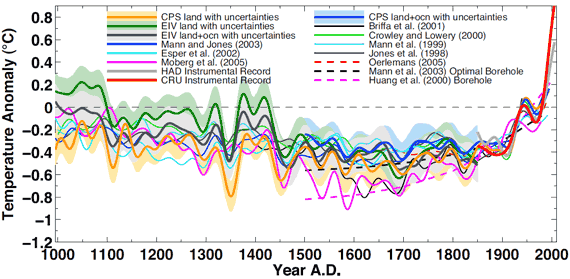
Figure 4: Various northern hemisphere temperature reconstructions (Mann et al 2008).
Anthropogenic Denial
Next up, Carter misrepresents the body of climate change attribution research.
"...no compelling empirical evidence yet exists for a measurable, let alone worrisome, human impact on global temperature."
Aside from the physical science which allows us to quantify the human impact on global temperature, there are the many different empirically observed 'fingerprints' of anthropogenic warming (Figure 5). And let's not forget the many different peer-reviewed global warming attribution studies (Figure 6).
Figure 5: Human-caused global warming 'fingerprints'
Figure 6: Net human and natural percent contributions to the observed global surface warming over the past 50-65 years according to Tett et al. 2000 (T00, dark blue), Meehl et al. 2004 (M04, red), Stone et al. 2007 (S07, green), Lean and Rind 2008 (LR08, purple), Huber and Knutti 2011 (HK11, light blue), and Gillett et al. 2012 (G12, orange).
Fingers Crossed
Carter ends like Lindzen, crossing his fingers and hoping we can adapt to the consequences of climate change.
"...a policy of adaptation is also strongly precautionary against any (possibly dangerous) human-caused climate trends that might emerge in the future."
Adaption is not precautionary, it's reactionary. A precautionary policy would involve efforts to prevent dangerously rapid climate change from happening by reducing greenhouse gas emissions.
Carter's Unscientific Approach
Although Carter's article may seem convincing to his intended audience, it is not because his arguments are at all factually correct, but instead because he has employed a Gish Gallop of scientific denial characteristics. However, this is clearly not an appropriate approach for a scientist speaking to the general public through the mainstream media. A scientist should always support his claims and ensure that they are factually accurate. And this is certainly not Carter's first such Gish Gallop - the Commonwealth Scientific and Industrial Research Organization (CSIRO) previously debunked another of Carter's articles here, and Skeptical Science has examined several others here.
If Bob Carter wants to influence the climate discussion, we believe he should subject his arguments to peer-reviewed scrutiny, rather than cobbling together Gish Gallops of scientific denial and misrepresentations for the finiancial media and denialist blogs.































 Arguments
Arguments





















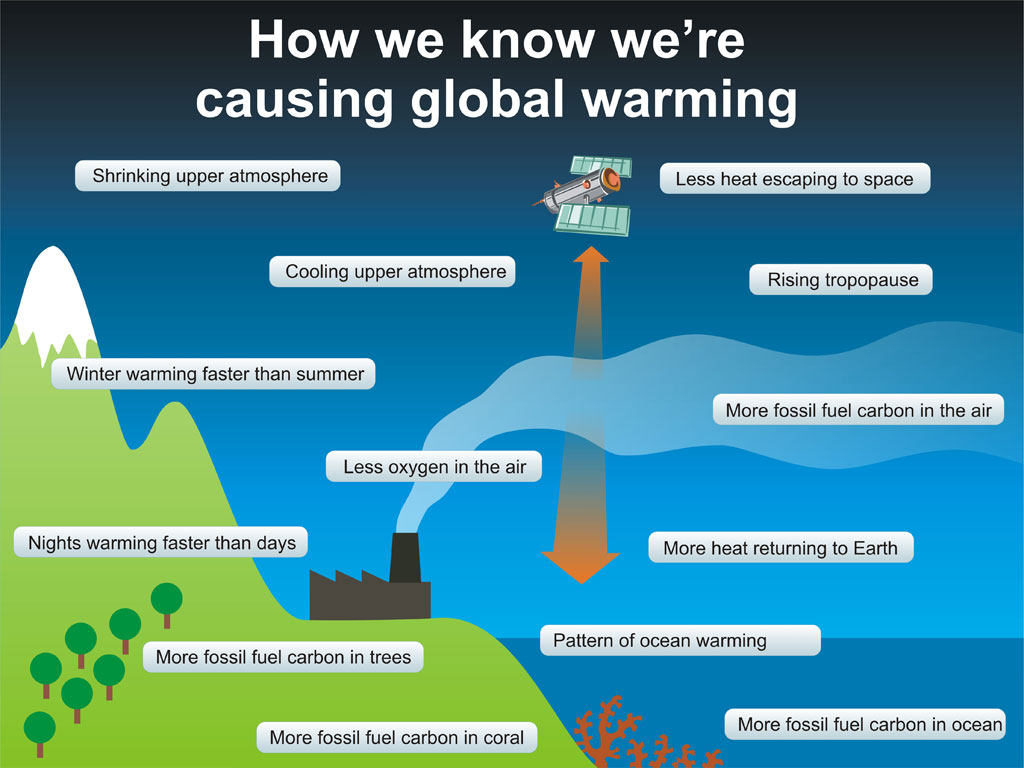
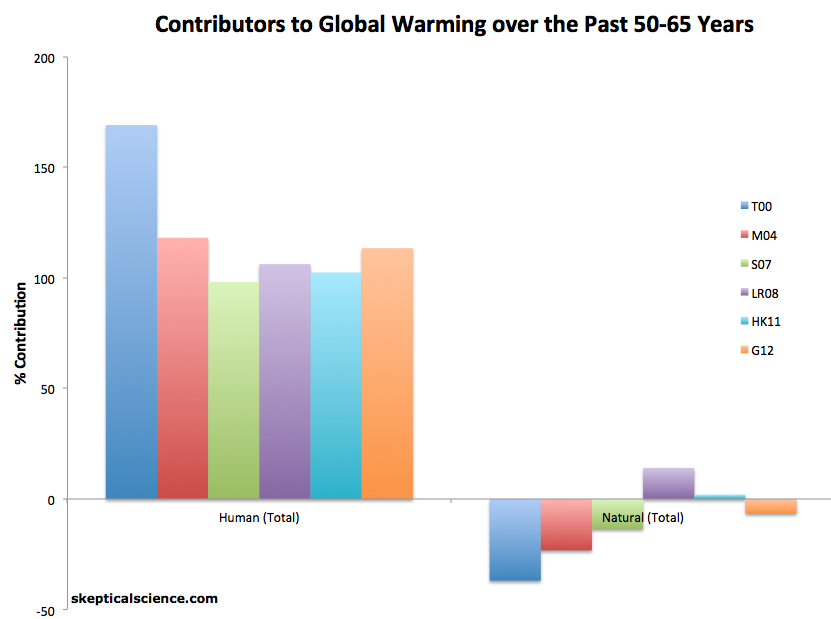


 0
0  0
0






Comments